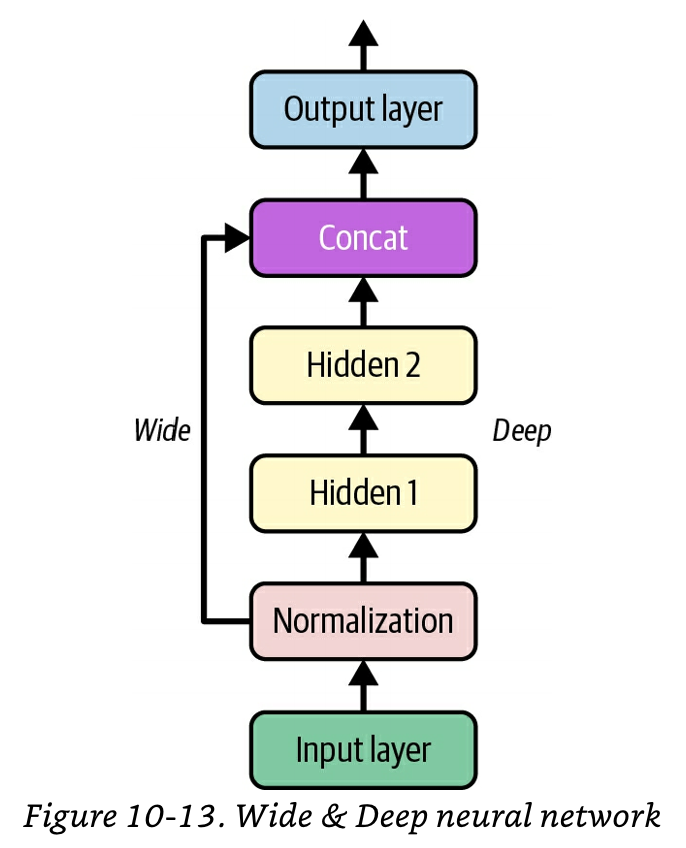File size: 2,728 Bytes
a2fef2b 681f9b2 a2fef2b 681f9b2 |
1 2 3 4 5 6 7 8 9 10 11 12 13 14 15 16 17 18 19 20 21 22 23 24 25 26 27 28 29 30 31 32 33 34 35 36 37 38 39 40 41 42 43 44 45 46 47 48 49 50 51 52 53 54 55 56 57 58 59 60 61 62 63 64 65 66 67 68 69 70 71 72 73 74 75 76 77 78 79 80 81 82 83 |
---
tags:
- model_hub_mixin
- pytorch_model_hub_mixin
pipeline_tag: tabular-regression
library_name: pytorch
datasets:
- gvlassis/california_housing
metrics:
- rmse
---
# wide-and-deep-net-california-housing
A wide & deep neural network trained on the California Housing dataset.
It takes eight inputs: `'MedInc'`, `'HouseAge'`, `'AveRooms'`, `'AveBedrms'`, `'Population'`, `'AveOccup'`, `'Latitude'` and `'Longitude'`. It predicts `'MedHouseVal'`.
It is a PyTorch adaptation of the TensorFlow model in Chapter 10 of Aurelien Geron's book 'Hands-On Machine Learning with Scikit-Learn, Keras, and TensorFlow'.

Code: https://github.com/sambitmukherjee/handson-ml3-pytorch/blob/main/chapter10/wide_and_deep_net_california_housing.ipynb
Experiment tracking: https://wandb.ai/sadhaklal/wide-and-deep-net-california-housing
## Usage
```
from sklearn.datasets import fetch_california_housing
housing = fetch_california_housing(as_frame=True)
from sklearn.model_selection import train_test_split
X_train_full, X_test, y_train_full, y_test = train_test_split(housing['data'], housing['target'], test_size=0.25, random_state=42)
X_train, X_valid, y_train, y_valid = train_test_split(X_train_full, y_train_full, test_size=0.25, random_state=42)
X_means, X_stds = X_train.mean(axis=0), X_train.std(axis=0)
X_train = (X_train - X_means) / X_stds
X_valid = (X_valid - X_means) / X_stds
X_test = (X_test - X_means) / X_stds
import torch
device = torch.device("cpu")
import torch.nn as nn
from huggingface_hub import PyTorchModelHubMixin
class WideAndDeepNet(nn.Module, PyTorchModelHubMixin):
def __init__(self):
super().__init__()
self.hidden1 = nn.Linear(8, 30)
self.hidden2 = nn.Linear(30, 30)
self.output = nn.Linear(38, 1)
def forward(self, x):
act = torch.relu(self.hidden1(x))
act = torch.relu(self.hidden2(act))
concat = torch.cat([x, act], axis=1)
return self.output(concat)
model = WideAndDeepNet.from_pretrained("sadhaklal/wide-and-deep-net-california-housing")
model.to(device)
model.eval()
# Let's predict on 3 unseen examples from the test set:
print(f"Ground truth housing prices: {y_test.values[:3]}")
x_new = torch.tensor(X_test.values[:3], dtype=torch.float32)
x_new = x_new.to(device)
with torch.no_grad():
preds = model(x_new)
print(f"Predicted housing prices: {preds.squeeze()}")
```
## Metric
RMSE on the test set: 0.546
---
This model has been pushed to the Hub using the [PyTorchModelHubMixin](https://huggingface.co/docs/huggingface_hub/package_reference/mixins#huggingface_hub.PyTorchModelHubMixin) integration. |